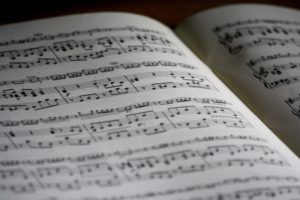
By: Isabel Thelen
Copyright infringement in song lyrics and composition has started to become ever-present in recent years.[1] Oftentimes, when an artist is asked about their songwriting process, the artist attributes it to a melody that suddenly came to them while dreaming, grocery shopping, or some other mundane daily activity.[2] However, what happens when the artist is claimed to have been inspired by another artist’s work?
3LW’s songwriters, Sean Hall and Nathan Butler, filed suit against Taylor Swift in 2017 for copyright infringement for the lyrics in her 2014 song, “Shake it Off.”[3] Hall and Butler are the writers for the hit 3LW song, “Playas Gon’ Play,” which they argue has a substantially similar chorus to Swift’s lyrics “haters gonna hate” and “players gonna play.”[4] The 3LW lyrics contain the phrases, “playas, they gonna play” and “haters, they gonna hate,” which are at the heart of the issue.[5]
When an artist or songwriter creates a song, they must register it with the Copyright Office in order to maintain copyright protection.[6] The song then has two different copyrights: the sound recording by the artist and the musical composition of lyrics and instrumentals.[7] Section 102(a) of the Copyright Act establishes that a musical work is an “original composition” that is “fixed in some tangible medium of expression.”[8] While Hall and Butler’s song was properly subject to copyright protection, the issue is whether the two simple phrases “haters gonna hate” and “players gonna play” are subject to the same level of protection as the entire song.
Nowadays, these two phrases are widely known within our common vernacular, but when the 3LW song was released, the songwriters alleged that these phrases were original.[9] The Supreme Court established in Feist Publications v. Rural Telephone[10] that the “originality” requirement need only be “some creative spark” or a “modicum of creativity.”[11] Hall and Butler argue that their creativity and originality can be shown through the “sequence and structure” of the lyrical composition and thus the phrases are copyrightable.[12] Swift’s argument relies on the fact that these phrases are in the public domain and are too short and simple to be copyrightable.[13]
The U.S. District Court for the Central District of California is expected to render a decision in the next few weeks after years of sparking debate. Should the court hold that Hall and Butler’s phrases are, in fact, copyrightable, there will likely be an increase in the number of song-writing litigants arguing that their copyrights have been infringed upon.[14] Rather than promote innovation, the stricter scope could lead to a future of intense lyrical scrutiny and halt artistic development.
The holding of Hall v. Swift will provide new precedent as to the scope of copyright protection and whether even the simplest of lyrics can meet the originality requirement.[15] While this might provide a stronger level of protection for composition copyright holders, it will more likely limit songwriting and stunt creative growth.[16] Artists creating works in the future may have to be wary because short and common phrases in copyrighted songs may be off-limits for use. The party who would suffer the most from this outcome would not be Taylor Swift, but instead smaller artists who may become potential targets and do not have the same means to protect themselves.[17] Copyright was not created for one entity to claim ownership over common vernacular, but with the intent to protect the integrity and originality of lyrical works.[18]
[1] Amy X. Wang, Why All Your Favorite Artists Are Suddenly Being Sued, Rolling Stone (Aug. 2, 2019), https://www.rollingstone.com/pro/features/katy-perry-led-zeppelin-ed-sheeran-music-lawsuits-865952/.
[2] Where the World’s Biggest Musicians Find Inspiration, ICMP (May 18, 2020), https://www.icmp.ac.uk/blog/where-worlds-biggest-musicians-find-inspiration.
[3]Amanda Holpuch, Taylor Swift Copyright Lawsuit May Go to Trial, Judge Rules, N.Y. Times (Dec. 10, 2021), https://www.nytimes.com/2021/12/10/arts/music/taylor-swift-lawsuit-shake-it-off.html.
[4] Madison Mills, Taylor Swift Says She Couldn’t Plagiarize a Song She Never Heard, Bloomberg Law (Aug. 9, 2022, 3:19 PM), https://news.bloomberglaw.com/ip-law/taylor-swift-says-she-couldnt-plagiarize-a-song-she-never-heard.
[5] Marlene Lenthang & Juliette Arcodia, Taylor Swift Asks Judge to Dismiss ‘Shake it Off’ Lawsuit, NBC News (Dec. 21, 2021, 9:41 AM), https://www.nbcnews.com/news/us-news/taylor-swift-asks-judge-dismiss-shake-copyright-lawsuit-rcna10291.
[6] US Copyright Off., Copyright Registration for Musical Compositions (2021), https://www.copyright.gov/circs/circ50.pdf.
[7] US Copyright Off., What Musicians Should Know About Copyright, Copyright.gov, https://www.copyright.gov/engage/musicians/ (last visited Oct. 17, 2022).
[8] 17 U.S.C §102(a).
[9] Scott Hervey & Weintraub Tobin, Nothing Original About a Player Hater, JD Supra, https://www.jdsupra.com/post/contentViewerEmbed.aspx?fid=c4773e11-086e-459d-8361-ff4b3ee18233 (last visited Oct. 17, 2022).
[10] Feist Publ’n, Inc. v. Rural Tel. Serv. Co., 499 U.S. 340 (1991).
[11] See id.
[12] Bernie Pazanowski, Taylor Swift Faces ‘Haters’ and ‘Playas’ in ‘Shake it Off’ Trial, Bloomberg Law (Dec. 10, 2021, 11:26 AM), https://news.bloomberglaw.com/ip-law/taylor-swift-faces-haters-and-playas-in-shake-it-off-trial?context=search&index=1.
[13] See id.
[14] Lenthang & Arcodia, supra note 5.
[15] See id.
[16] Amy X. Wang, How Music Copyright Lawsuits Are Scaring Away New Hits, Rolling Stone (Jan. 9, 2020), https://www.rollingstone.com/pro/features/music-copyright-lawsuits-chilling-effect-935310/.
[17] See id.
[18] Gersham Johnson, All Songs Are Derivative Works: Copyright and the Reality of Music Composition, Colum. J. L. & Arts (Dec. 17, 2020), https://journals.library.columbia.edu/index.php/lawandarts/announcement/view/370#_ftn2.

